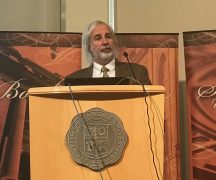By JAN LARSON McLAUGHLIN
BG Independent News
Bowling Green City Council split 4-3 Monday evening on enacting a temporary moratorium on medical marijuana cultivation, processing and retail dispensary facilities. So despite a request from the city attorney and city planner, the moratorium was scrapped.
Council members Daniel Gordon, Bruce Jeffers, Sandy Rowland and John Zanfardino voted against the moratorium, while Mike Aspacher, Bob McOmber and Scott Seeliger voted in favor.
After the meeting, City Planner Heather Sayler said her office has received two phone calls from prospective medical marijuana representatives asking where they would be allowed to do business in the city. As it is now, a retail operation could go in commercial zoned areas, a processing operation could go in industrial, and growing could occur in agricultural zoned areas.
The state legislature passed the medical marijuana bill earlier this year, making Ohio the 25th state to legalize marijuana use for medicinal purposes. But few community regulations have been established, so several municipalities are enacting temporary moratoriums on medical marijuana cultivation, processing and retail dispensary facilities.
“We’ve been watching the state for weeks, waiting for some rules and regulations,” City Attorney Michael Marsh said last month when the issue first came before council.
So “rather than have a free-for-all,” Marsh presented legislation asking that council put a hold on medical marijuana sales in the city until the state sets regulations. Marsh added that the city does not have qualified personnel to set regulations for growing, processing or selling pot.
But Gordon said he was not willing to add further burden on ill people who could benefit from medical marijuana. On Monday evening, Gordon reaffirmed his opposition to a moratorium.
“I continue to feel the legislation is unnecessary and counterproductive,” he said.
Council President Mike Aspacher noted last month that Bowling Green applies rules to tattoo businesses, dance establishments and grocery stores. “I think it would be irresponsible,” to not do the same with marijuana, he said.
Sayler said her office is waiting for some direction from the state. “It’s new to everyone. We don’t have any guidance yet.”
But Gordon said the greater error would be to deny the drug to people in need.





